Let this insecure, borderline psychotic manchild with anger issues explain. Soon you too can gain the respect of your daughter your big gun entitles you to.
The real wtf is how many people agree with/excuse this douchenozzle.
Let this insecure, borderline psychotic manchild with anger issues explain. Soon you too can gain the respect of your daughter your big gun entitles you to.
The real wtf is how many people agree with/excuse this douchenozzle.
Meanwhile, last weekend, I was busy drinking beer and watching the rugby. I took some pictures and would like to share them with y’all. All the cool middle aged blokes with beards and hats kids are beerblogging, so why not me?
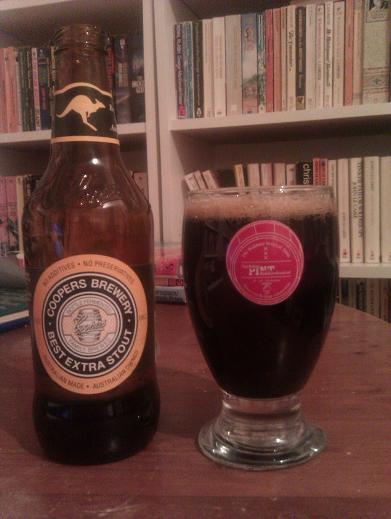
How often do you get the chance to drink an Australian stout? Not often, so I had to try it. Coopers Extra Stout, brewed in South Australia is perfectly drinkable, tastes just like any other stout but lacks a bit of oomph once you get through the initial taste. Decent, not spectacular, would drink again if in the vicinity of where it was brewed.
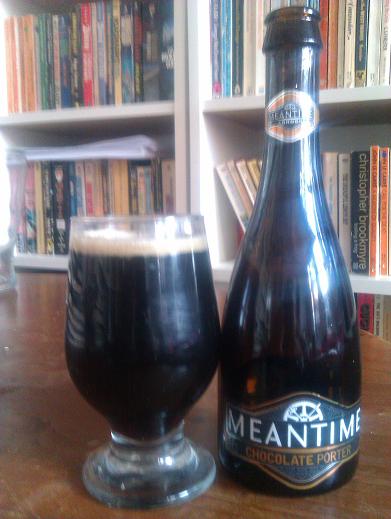
Gorgeous. I’ve had a few chocolate stouts, but not yet a chocolate porter (if there’s any real difference between a modern stout and a modern porter that is). Unlike many attempts, Meantime‘s porter keeps it’s chocolate undertones throughout the glass, doesn’t overwhelm the beer with the chocolate or vice versa and will be gotten again this weekend if I can.
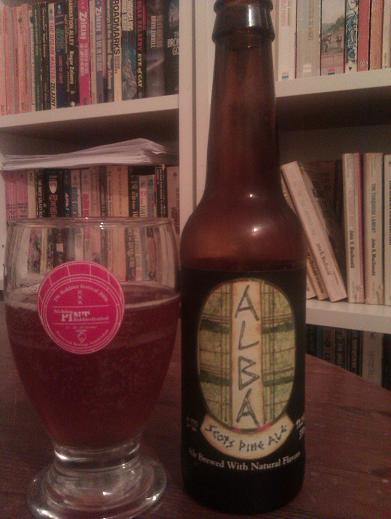
The first of four different ales I drunk this weekend, this was the best. A pine ale, which I hadn’t heard of before, but which tasted very nice. According to the label, Alba is a “triple style ale, brewed to a traditional Highland recipe using the sprigs of spruce and pine collected every spring”. How traditional this is, is anybody’s guess as IIRC, the Scottish Highlands haven’t had their pine and spruce coverings all that long. Doesn’t matter for the taste, which is nice and beery going in, with a decided aftertaste of swiss roll (!), which sounds strange but works, especially after the slightly more bitter chocolate porter. Will get more from this one as well.
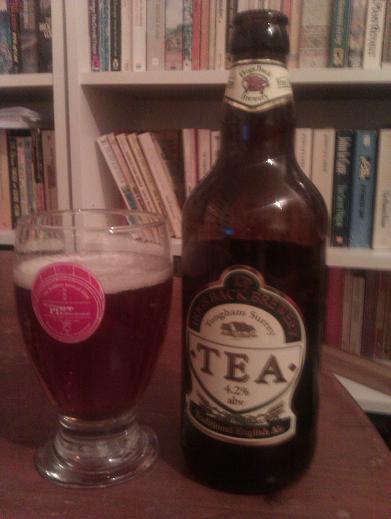
Hogsback‘s T.E.A., Traditional English Ale, was recommended by one of the Bierkoning‘s staff, but was a disappointment. A run of the mill ale, which started alright but whose flavour didn’t last; might have been better in a smaller bottle.

The Welsh Double Dragon ale, which is the same strength as the T.E.A., 4.2%, I got for the Ireland v Wales Six Nations match and it worked, in so far as the Welsh won. Better than the previous ale, still a bit on the bland side for me. Decent enough, but nothing special. Will drink in Wales, will likely not go out of my way for it.
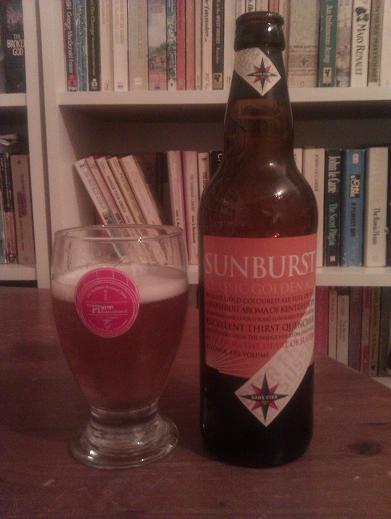
Darkstar’sSunburst on the other hand, a golden ale from Sussex is brilliant. This tasted like an English ale should, not too bitter, but with a slightly nutty aftertaste and which is sustained throughout my drinking it. Would like to drink more of it.
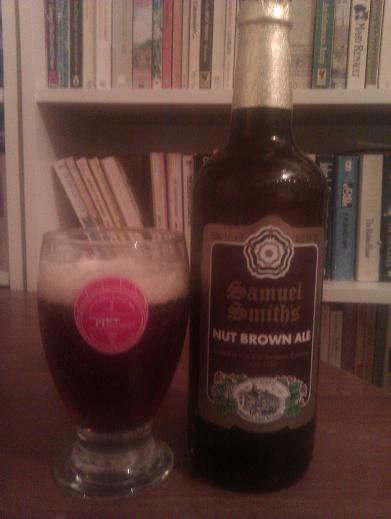
Speaking of nutty, the last beer of the weekend (actually drunk on a Monday evening) was very nutty, but then this is Samuel Smith‘s nut brown ale, coming all the way from Yorkshire and brewed at what they claim is the oldest brewery there. Lovely taste, eminently drinkable, not very damaging. Will get more of this too.
So in total: seven beers sampled, two or three disappointments, four beers I will shortly get again.

One of the more frustrating aspects of the rise and rise of Geert Wilders and his Freedom (sci) Party has been the general unwillingness of serious people in the media and politics to actually call them what they are: bigots and racists. That the average Dutch person was never as tolerant of foreigners as our reputation of a liberal, tolerant country would imply I long knew, but I assumed that at the very least his leftwing political opponents would have the courage to call him out on his bigotry, rather than hiding behind terms like “populist”. Yet with some honourable exceptions, Wilders and his ideas have been taken seriously by the political establishment, both on the right and the left, in so far as they are not rejected out of hand, but as viewpoints that can be debated and taken seriously into consideration, even if you disagree with them, as normal bits of political thought. Hence such foulness as the upcoming burqa ban, now in parliament, where the bullying of a minority group in Dutch society by forbidding its members their traditional clothing is sold as somehow feminist and serious people debate the merits of this.
But now Wilders may have gone too far. Not content with being an anti-Muslim bigot, where in the past decade he had the political climate with him, he has now branched out into more traditional territory for bigots, by starting hating on Eastern and Middle European migrants — and he doesn’t mean Austrians by that. Polish and other Eastern European migrants have been coming to the Netherlands in large numbers in the past ten years, ever since these countries became part of the EU and they gained the rights of all EU citizens, to work and live in any country in the union. These migrants fit the classical pattern of the labour migrant, first coming over for short term work Dutch workers are hard to find for, slowly branching out into more permanent work, finally bringing over their families and settling in the country for good. There’s the usual exploitation, as Dutch employers under pay or under report their Polish workers, landlords rent them awful flats and charge them a fortune for it, which in turn brings along the usual fallout of social problems any city with a huge influx of unexpected migrants has to deal with: lack of living space, lack of amenities for these people in their own language, culture clashes, heightened visibility of social conflict (petty crime, drunkenness et all) the more noticable because it’s done in a new language, and so on. Nothing new, but the same Wilders voter who dislikes Islam is more than likely not to find these Poles all that attractive either.
Which Wilders has now attempted to cash in on, by opening an online registry for complaints about those people, about how they took your job, they were criminal, they were violent, noisy neighbours, spoke filthy foreign languages, just are not properly Dutch. Classic racist dogwhistling, in other words. Surely now the fiction that Wilders is just a populist, a too strident critic of Islam and certain of its practises but not a bigot or a racist, oh no, can no longer be maintained. Or can it?
I hope I’m right and serious political commentators will finally have the courage to say what is plain to see, that he is a bigot and should be treated as such, but I’m not hopeful. If nobody twigged on three years ago, when he’d said he would like to deport millions of Jews Muslims from Europe, why will they now?
Sandra would’ve loved this weather. Not the cold so much, as her kidney troubles and other health problems leaving her vulnerable to colder temperatures just like my more proportioned build left me cursing milder weather. Besides which, she always was nesh, stemming from a childhood when winters were routinely bitter cold and central heating non-existing. But despite this, she’d still rather have cold, crisp, clear winter days like today was, then the endless grey and wet misery that’s the usual Dutch winter, when the country draws into itself from November to long into April if you’re unlucky. She had been spoiled with winters in Plymouth, Devon and Cornwall’s relatively southern latitude and gentle caress of the Gulf Stream ensuring almost sub-tropical winters. I remember being there with her in November one year, still walking around in t-shirt when I had had to wear a wintercoat and gloves in Amsterdam the day before…
She’s beyond such cares now of course, today making it exactly three months since she died. Sometimes I wonder if the prospect of another long, grey Dutch winter didn’t help her make the decision not to fight on anymore. I can’t blame her if true, but I do miss her. Especially when something like the video below happens. Four months ago I would’ve rung her to share its awwness, or shown it to her on Youtube the next day, now there’s nobody to share it with, well, expect all y’all:
Adorable, isn’t it? The kitten that is, not Kenny Dalgliesh.
A bad start to my day this morning, as I read the news that John Christopher had died. Of course, at age 89 it’s hardly a surprise, but still. As Damien Walker explains, for my generation of readers he was oftenan important first introduction to science fiction:
Readers of my 30-something generation are most likely to remember John Christopher for his young adult novels The Tripods and its adaptation for the small screen in the 1980s. The Tripods describes a future Britain where humanity has been enslaved to a race of alien invaders who travel in giant, three-legged walking machines. Fragments of The Tripods are lodged very deeply in my imagination, in particular the horrifying sense of immense and all-powerful authorities looming over life, beyond our control and understanding.
The Tripods Trilogy were not quite the first science fiction books I read in English rather than Dutch (having discovered that the local library was much more lenient in lending out English rather than Dutch adult books), but they were close. Appropriately I discovered them in the high school’s tiny little lending library, where they were some of the few books that appealed to me when I discovered it in my first year there. Having part of the first year of students who’d gotten English in their last year at primary school, I could just about read them, though they were supposedly a few grades about my reading level. They were the perfect sort of book for young teenagers, fitting that classic template of the young boy on the verge of initiation into adulthood rebelling against the strictures of his people, who runs away from home and finds the secret truths of his world, then fights and wins to restore the true order of things, and Christopher told it brilliantly. I must’ve reread them half a dozen times or more.
There was also The Guardians, about a young boy in a future dystopian England growing up to discover the true nature of his country and setting out to right ancient wrongs, which I also read half a dozen times or so. He was a consumate storyteller and could get you so wrapped up in a book you’d barely notice the time, as Jo Walton also experienced:
It was his 1977 novel Empty World that caused me to realise that adolescents were the natural continuing readers of cosy catastrophes. In Empty World all the adults and little children die of flu and the world is left to a handful of teenagers — this is so viscerally adolescent wish fulfillment that reading it (at twenty-two) I failed to get off the train and was carried on to Liverpool.
What greater compliment can any writer wish for?